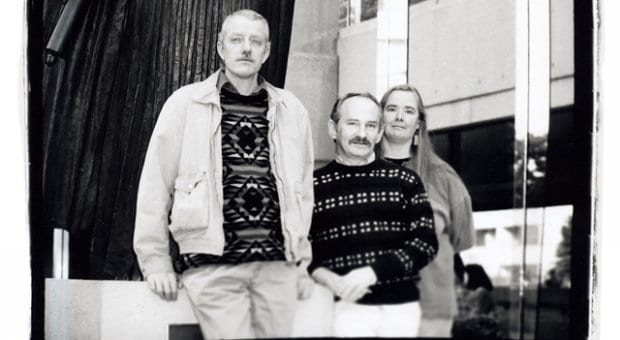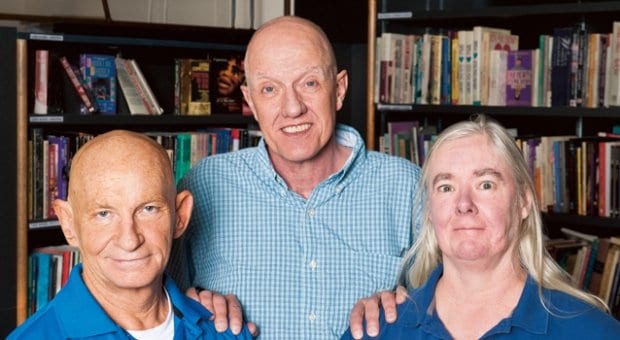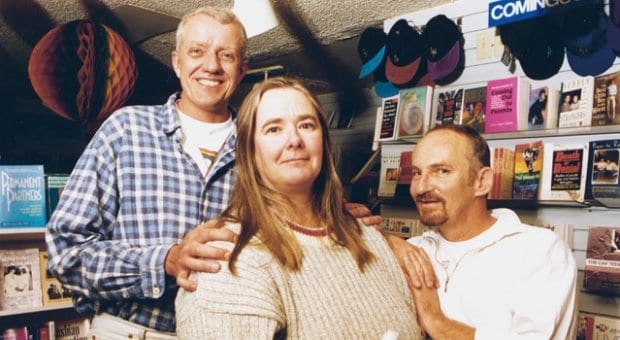
Bruce Smyth, Jim Deva and Janine Fuller at the BC Supreme Court in 1994, on the eve of the Little Sister's versus Canada Customs trial. The case would go all the way to the Supreme Court of Canada and result in a partial win. Credit: Daniel Collins

Little Sister's co-owners Jim Deva and Bruce Smyth and manager Janine Fuller have spent the last 30 years stocking their shelves with gay stories (and sex toys). Credit: Belle Ancel
For 30 years, Little Sister’s bookstore has been the figurative heart of Vancouver’s Davie Village.
Since opening on May 3, 1983, Little Sister’s has been a gathering place, a place where young gays have ventured curiously as they first came out, a de facto gay community centre.
It has also been a focal point for activism, a jumping-off point for marches and protests, and a champion for countless court cases against government discrimination and censorship.
It’s hard to imagine how Vancouver’s gay community might have differed, or suffered, if long-time partners and Little Sister’s co-owners Jim Deva and Bruce Smyth had gone into a different line of work instead.
Deva had studied to be a teacher, earning a bachelor of education in English literature.
“They weren’t really fond of out gay high school teachers in 1974,” he recalls. “I would have to go out into the country and become a teacher and go into the closet.”
Instead, he and Smyth moved to Vancouver and worked in retail, eventually hoping to go into business for themselves. They considered different options, including opening a clothing or shoe store, before deciding on books.
“It was perfect timing and we knew it. The gay community was just growing in the West End; it was just beginning to really flourish,” Deva says. “We didn’t really know what we were getting into, and that was probably a good thing, or we may not have gone there.”
From almost the beginning, Little Sister’s faced an onslaught of obstacles.
In May 1985, just two years after opening, Canada Customs agents seized a shipment of lesbian magazines headed to Little Sister’s.
In December 1986, Customs seized more than 600 books and magazines the bookstore had imported from the US. The agents claimed the materials violated Canada’s obscenity laws. According to a report in The Vancouver Sun, the seizures cost Little Sister’s more than $16,000 in potential sales missed and impound fees.
Deva was initially reluctant to raise a fuss and risk further upsetting Customs officials. But as the seizures continued and threatened to put Little Sister’s out of business, he and his partner decided to fight back.
It was the beginning of an epic 20-year legal battle that would go all the way to the Supreme Court of Canada. It’s a battle that remains unresolved today. A partial victory in the highest court in 2000 chastised Canada Customs for unfairly targeting imports destined for the gay bookstore but upheld the agents’ right to seize materials they considered obscene.
When border agents again seized several SM books less than a year after that ruling, Little Sister’s renewed its challenge. But a lack of money and a 2007 court ruling against advance funding to pursue the case meant Little Sister’s was unable to take the Canada Border Services Agency back to court.
Deva says that finding proper legal representation was a challenge in itself.
“We went through about three or four lawyers who wouldn’t even defend SM,” he says. “They thought it was atrocious themselves.”
In addition to the decades of unfair seizures and censorship battles, the bookstore faced other threats. In December 1987, a bomb exploded in the stairwell between Little Sister’s and the restaurant located beneath it. No one was hurt, according to a small 89-word story in The Vancouver Sun.
Two months later, it happened again. Another explosive device was thrown through the back door of the restaurant during a busy Saturday night. Again, no one was hurt, though the packed restaurant had to be evacuated.
The bombings cast a chill over many in the gay community and gave renewed credibility to the threats being phoned in to Little Sister’s and other gay businesses in the area. But Deva and Little Sister’s soldiered on, refusing to give in to government censors or other bullies. Over the years, it solidified into a local and national symbol of the fight for gay rights.
“More than anything else, Little Sister’s represents the power of community,” Deva says. “Little Sister’s has never just been about one person, or two, or three, or four. It’s always been about a community.”
Five years ago, on the eve of Little Sister’s silver anniversary, Deva and Smyth put the store up for sale.
“In the process of talking about this 25-year journey we’ve been on, I think it’s the right time for myself and my partner to step back and find somebody else to continue,” Deva told Xtra in an interview at the time. “It just feels from a very personal level that I’m ready for something different.”
Five years later, the pair is still here.
“We had a couple of kind of interesting offers but then realized that it was going to affect a lot of people’s lives. In other words, the people who wanted to take over did not want to maintain the staff,” Deva explains. “I just kept visualizing myself laying on a beach somewhere wondering how badly I fucked over everybody’s life, and I couldn’t do it.”
Not only are Deva and Smyth still in business, but they’ve started expanding. In December 2011, they opened Sweet Adult Boutique, a loose spinoff of Little Sister’s.
Tucked into a tiny strip mall at Hemlock and Broadway, Sweet focuses on sex toys: vibrators, DVDs, lubricants and massage oils. Deva estimates that 90 percent of Sweet’s clientele is straight.
“I feel like an apostle, but to straight people. I’m giving workshops on how to fuck your husband, and it’s being very well received, and I think I’m doing some good in the world,” he laughs.
“It’s either go big or get lost. Retail’s a real big challenge right now, an unbelievable challenge,” he adds.
He ventures that another location might also be in the works. “We want at least one more. It creates more buying power and positions us in the straight retail market.”
Perhaps most importantly, it moves away from a reliance on books.
Deva calls the modern book market “deadly.” Increased competition from larger retail chains and internet booksellers, which have more buying power and can therefore offer books and magazines at significantly lower prices, has undercut much of the gay book business.
Independent bookstores across Canada and the United States have been dropping like flies over the last decade, and gay bookstores are no exception. Even places with large gay populations, like New York City, aren’t immune to the pressures. Once the oldest gay bookstore in North America, the Oscar Wilde Bookshop closed in 2009.
There are just three left in Canada: Glad Day in Toronto, After Stonewall in Ottawa and Little Sister’s. To survive, they have had to adapt and diversify. After Stonewall has begun selling gourmet chocolate and handmade art and jewellery. It also holds wine events and evening yoga and tai chi classes. The others have also begun to branch out.
Deva seems determined to see Little Sister’s survive, though he is less sure what that will look like in the future.
Even getting books onto the shelves is becoming more difficult.
There is less gay literature being printed, and many of the smaller presses that continue to print are focusing on online sales and are not set up to work with retail stores. “To find a small press that’s willing to wholesale to a little bookstore in Vancouver, it’s very difficult,” Deva says.
He has also noticed a shift in the gay material that is published: fewer books seriously question societal norms and traditions.
“Gay and lesbian work gets published, but [nothing] that actually challenges our society, which is what our work used to do,” he says. “I haven’t read anything that really challenges me in quite some time, which is really unfortunate. But, if it’s there, we’ll certainly have it on our shelves.”
That’s not to say that there aren’t quality queer writers. Deva is currently enthralled with Amber Dawn’s new book, How Poetry Saved My Life. “[It’s] absolutely amazing, but how significant it is for gay and lesbian issues, I’m not sure. It’s talking about sex work and the rawness of sex work,” he says.
Despite the shifting, shrinking book market, Little Sister’s has so far survived where so many others have failed, thanks to its well-stocked shelves of sex toys.
“The one part of the store that continues to do extremely well is the toys and the sexual part of it,” Deva says.
But there, too, he is witnessing a shift, this time in clientele. Whereas during the first 15 to 20 years of Little Sister’s, his customers were almost exclusively gay and lesbian, that’s no longer true, he says.
“It is now doing well because straight couples are exploring their sexuality, much like we did 20 and 30 years ago.”
Deva says that he now has more in common with straight couples who are breaking out of the sexual norm than he does with the more sexually conservative younger generation of gay men and lesbians. To him, being gay has always been about being different, and he questions the movement of gay society into the mainstream.
“Defying society, I think that is our role as queer people, as gay people,” he says. “But it’s not about young people dating. Jesus Christ. Give me a break. And living happily ever after in the suburbs with two children?
“I now actually relate more to couples and individuals that are straight that are exploring their radical sexuality than I am with my own community. We’re selling now to more and more straight folks,” he says. “I now sell buttplugs to straight couples so that she can fuck him, and I think, Good on you.
“To me, if the store is going to remain open, it will be because of the straight community, not the queer community,” he says.
For the past 30 years, Little Sister’s has presented a fairly accurate reflection of the state of the gay community, Deva says.
“When we had our 25th [anniversary] — that was only five years ago — it was totally all over remembering the past and how it met with the future and where we were at,” he says. “I’m just totally not there now. I’m [in the mind of], ‘It happened, it was good, move on.
“I think that the attitude I have right now probably reflects an attitude of our community, and that is: in five to 10 years will there be a community? Will Xtra be printing? We don’t know that. We have no idea,” he says.
“What will the community look like and what will be the significance or importance of the community? I think we’re at a spot right now where it could go any way. It’s totally unpredictable.”
Deva says that after gay marriage was legalized in Canada 10 years ago, much of the gay activist community began to disappear. He suspects that once the United States gets the same, its communities will also face the same apathy.
“I don’t want to hear the bullshit. I’ve heard way too many years of community strength and growth and working together and blah, blah, blah. It’s all bullshit,” he says. “We’re all in it for our own personal satisfaction and to have our personal needs met, and very few people now, I think, in the gay men and lesbian community really have many needs that they think need to be met by a sense of community.”
Deva believes the gay community as we know it now will dissipate, disappear and then re-form in other avenues. “It will be queer sex, sexual freedom movements and movements away from sort of societal norms,” he says. “There will be minorities of sexual perverts, but it won’t be gay, lesbian, anything. It will have to do with a way more sexual minority.
“It’s an interesting time,” he says. “I really think whether we actually will continue with the sense of community and the importance of community or not… I don’t know the answer, but I’m intrigued. Do we need to get together socially and talk as a community or a minority? Is it important or not? Is it important that we read about other gay people, or would it be better to read regular folks’ literature and assimilate? Is it important to read gay-specific literature? I’m not sure.”
“[Little Sister’s] will last as long as our community does,” he promises. “We will continue to have books; we will continue to bring in almost every book that we can.
“It’s a very interesting time, and it is for the bookstore, too.”

 Why you can trust Xtra
Why you can trust Xtra


